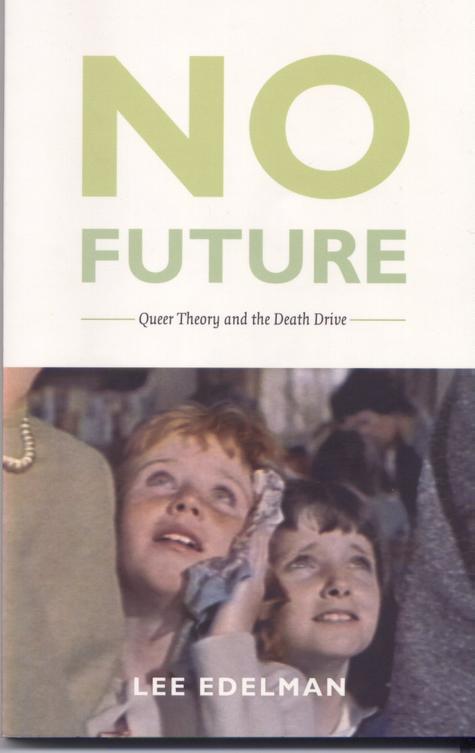February 26, 2005
We aren't the world
Daddy told me look into the future/sit at your computer, be a good girl
A book about the death drive which attacks 'reproductive futurism' and the Child?
No, I don't make it up, honest.
Lee Edelman's No Future: Queer Theory and the Death Drive is, in Lacanian terms, an Impossible polemic. How could anyone not be on the side of the children, of the future, he asks, when the
'child remains the perpetual horizon of every acknowledged politics, the fantasmatic beneficiary of every political intervention. Even proponents of abortion rights, while promoting the freedom of women to control their reproductive choice, recurrently frame their political struggle, mirroring their anti-abortion foes as a "fight for our children - for our daughters and sons," and thus as a fight for the future? What, in that case, would it signify not to be "fighting for the children"?' (2-3)
Edelman's answer is that 'the side outside the consensus by which all politics confirms the absolute value of reproductive futurism' is queerness. In Edelman's analysis, the queer becomes the name for the death drive itself, which as we know from Freud, Lacan and Zizek is not the desire for death, quiescence or calm but, very much to the contrary, that which disrupts all efforts to produce a self-sufficient wholeness. It is what brings death to all systems that tend towards the settled, the unliving force which introduces the Outside into all interiorities.
One of the most powerful aspects of the book is the quotations forcefully equating homosexuality with death and anti-futurism that Edelman unearths from the self-styled Guardians of Civilization . Take, for instance, Francois Abadie, the fomer mayor of Lourdes, who called homosexuals 'those who care nothing for the future ... the gravediggers of society.' Or Father John Miller, author of Called by Love:'Gay activity is wholeheartedly determined to do battle against human life.' And the Pope, on same-sex unions: 'Such a "caricature" has no future and cannot give future to any society.'
Rather than resisting the 'heteronormative' equation of homosexuality with death, sterility and the anti-social, Edelman says that such associations should be embraced. The role of the queer is a structural function for the social order as such, so even if the boundaries of sociality were extended to fully accommodate homosexuality, the disavowed-insistent agency of the death drive would be attributed to/abjected onto another group. Better, then, to take the side of discontent against civlization.
It is not that homosexuals should give up the struggle for rights, Edelman argues, but for this to be the limit of homosexual aspiration would be a total capitulation to the social order. Negotiating for 'acceptance' and 'recognition' from civilization is to grant the social order too much. And the alibi for the authority of the social is not the Father's law, for the contemporary patiarch is now required to legitimate his authority by reference to the emblem of civilization, the Child.
'Thus, while lesbians and gay men by the thousands work for the right to marry, to serve in the military, to adopt and raise children of their own, the political right, refusing to acknowlege these comrades in reproductive futurism, counters their efforts by inviting us to kneel at the shrine of the sacred Child: the Child who might witness lewd or inappropriately intimate behaviour; the Child who might find information about dangerous "lifestyles" on the Internet; the Child who might choose a provocative book from the shelves of the public library; the Child, in short, who might find an enjoyment that would nullify the figural value, itself imposed by adult desire, of the Child as unmarked by the adult's adulterating implication in desire itself; the Child, that is, made to image, for the satisfaction of adults, an Imaginary fullness that's considered to want, and therefore to want for, nothing.' (21)
Hence we are all coralled into holding hands with little orphan Annie and singing rousing hymns to the redemptive telos of 'tomorrow'. Yet tomorrow is indeed 'always a day away': it never arrives, not contingently, but structurally.
The figure who refuses the future is not the homosexual per se, but what Edelman calls, in a Lacanian neologism, the sinthomosexual. The concept of the 'sinthomme' arises, according to Zizek, from Lacan's attempt to answer the question: 'how do we account for patients who have, beyond any doubt, gone through their fantasy, who have obtained distance from the fantasy-framework of their reality, but whose key symptom still persists? ... Lacan tried to answer this challenge with the concept of the sinthome, a neologism containing a set of associations (synthetic-artificial man, synthesis between symptom and fantasy, Saint Thomas, the saint...)' (Sublime Object of Ideology, 75).
Edelman selects Scrooge and Silas Marner in the nineteenth century as examples of the sinthomosexual who are redeemed - which is to say, violently destroyed - through the agency of the Child. In the twentieth century, Leonard (Martin Landau), in Hitchcock's North by Northwest is Edelman's paradigmatic dissenter from reproductive futurism. Unlike Roy Batty in Blade Runner, 'Saint Leonard' refuses to offer the hand of friendship to Cary Grant's Thornhill when he is seemingly about to fall to death from Mount Rushmore. But there is much more at stake in Leonard's refusal than in Batty's, since Thornhill is himself trying to save Eve Kendall (Eva Marie Saint). Leonard's standing on Thornhill's hand is a rejection of the 'reproductive couple' and thus of the future itself.
'In breaking our hold on the future, the sinthomosexual, himself neither martyr nor proponent of martyrdom for the sake of a cause, forsakes all causes, all social action, all responsibility for a better tomorrow or for the perfection of social forms. Against the promise of such an activism, he performs, instead, an act: the act of repudiating the social, of stepping, or trying to step, with Leonard, beyond compulsory compassion, beyond the future and the snare of images keeping us always in its thrall. Insisting, with Kant, on a freedom from pathological motivation, on a radical type of selflessness no allegory ever redeems, the sinthomosexual stands for the wholly impossible ethical act. And for just that reason the social order .... proves incapable of standing him.' (101)
 |  |
One of the great virtues of Edelman's thesis is that it restores the distinction between queerness and homosexuality per se. Edelman goes some way to returning the uncanniness attached to queerness which has been dispelled by the very signifier 'gay' and the cosy, Kylie-loving, unthreatening cheeriness with which it has become associated.
Although Edelman has little to say about capitalism, it is surely not accidental that the production of 'gay' identity over the last twenty five years has coincided with the collapse of effective political alternatives to capitalism. Even though there is no doubt that homosexuality will never be accepted by certain Defenders of Civilization, capitalism (whose relationship to social stability is far from straightforward) seems comfortable with the prospect of 'gayness' as yet another marketing category. Indeed, a focus on sexuality has disippated the political pressure put on the Family itself. While demands are restricted to lobbying for the right to have same-sex 'unions' recognized and to rear children, familial domesticity retains its heterononormative force.
The will to inclusion will only confirm heteronomativity's right to include and exclude. That is why Edelman is highly critical of Judith Butler, who assumes that a wider, more inclusive definition of the human is either possible or desirable. Edelman's point is that the queer is simply that which cannot be included in any allegedly closed 'wholeness'.
When Edelman seeks to articulate this 'unthinkable' position, he describes it as 'against all reason', but it is hard to see why. We only have to recall Schopenhauer's observation that, if reproduction were made a matter of rational reflection then the species would die out within a generation to give the lie to this. It is the reproductive impulse that is against, or at least oblivious to, reason.
It is often not clear whether Edelman is opposed to politics as such or is agitating for a wider definition of the political. It seems to me that, rather than equivocating politics with 'the social' (as Edelman seems to) the true site of political struggle lies in what the dominant order calls the extra-political. When there is only one (permissible) side, it is imperative to locate the Outside.
Of course, children themselves are the first victims of the cult of the Child, since they are permitted only to act in accordance with their signifying function: they are tyrannized by the Future that they are held to represent. (With such a fixation on the Future, and with the Future always understood in bleakly domesteconomic instrumental terms, it is no surprise that depression is endemic amongst western teenagers. And also why 'No Good Advice' was so unexpectedly, nihilistically pertinent: these 'girls with no soul' are 'already wasted').
Also, it is presumably conceivable that reproduction could not lead to an automatic tendency to have faith in the social order and the social subject; however, you are up against two of the most crushing strata acting upon humans - the bio-fascist impulse to 'protect your own' and the social injuction 'to care for children and be happy about it'. (One of the many great virtues of Desperate Housewives is the Lynette storyline, which breaks contemporary taboos by daring to suggest that yes, children are energy vampires, no, motherhood is not innately fulfilling and endlessly wunnerful....)
(A paranthesis: while I read No Future, I was suddenly put in mind of the current 'controversy' whipped up around The Da Vinci Code. We should always be suspicious when 'suppressed' or 'forbidden' knowledge which would supposedly scandalise the big Other becomes so widely disseminated. What we have to ask is, if something is this popular, how can the big Other not know about it? The answer is that this is not the coming to light of subversive knowlege but a shift in what it is now permissible to believe; in other words, in what we are required to believe. If there is a 'conspiracy' it would be to conceal Christ's unplugging from organic community, reproduction and sexuality and to recover him for patriarchy.
Christ's hostility to the Family (not only in his notorious proclamation that we must hate our fathers and mothers, but also in his practice of abducting children from their kinship groups) has always been something of an embarrassment to Catholicism's Procreationist, Pro-life etho-cult. So nothing could be less disturbing, less subversive, than the image of Christ as a family man with sexual urges. Making Christ into 'our contemporary' in this way literally spirits away all of Christ's uncanniness, his queerness.)
Edelman's thesis also cries out to be extended to the Pop which lent his book its name. 'When there's no future how can there be sin?' All due respect to Lydon's subsequent strategies against r and r with PiL, but with that one line - a theopolitical thesis compressed into incendiary pop poetry, a line that, by itself, fully justifies Marcus' prima facie absurd trailing through centuries of heresies and dadaisms in Lipstick Traces, he gave us everything: punk as a destruction of everything we are told is Possible and Inevitable.
Certainly, Edelman explicitly identifies the logic of reproductive futurism as 'poptimism', whose 'locus classicus is Whitney Houston's rendition of the secular hymn, "I believe that children are our future", a hymn we might as well make our national anthem and be done with it.' (143) In fact, though, 'We are the World' might be the better choice for reproductive futurist anthem: we are the world, we are the children (therefore it is OK for us to bomb other people's children - because they aren't the Future.)
How does Rotten's 'No Future' fit with Edelman's? Punk might have seemed, as Jon Savage has said, 'aggressively straight', but its propensity for decoration, scarification and genderbleed, its refusal of sexuality, meant that it was in reality an amplification of a queerness that could then have been seen as an essential defining feature of Pop, locatable in Brian Jones, Glam and then, post-punk, in New Romanticism. Edelman makes the connection between the synthetic (cyberpunk figures outside the 'natural order of reproduction') and his sinthomosexual only in a footnote. Yet there is a surely a fascinating extension of his thesis to be done which will identify the 'sex' Foxx pledged alliegance to in 77 ('my sex is a spark of electroflesh') as synthomosexuals.
The paradoxically sustainable no-future is to be found, not in rock's endlessly dying merry-go-round, but in the thousand plateaus of disco. Savage has claimed that the impossible diagonal lying beyond lumpen punk's 'aggressively straight' anti-sex 'puritanism' and disco's 'hyper-gay' hedonism was Moroder and Summer's 'I Feel Love'. Where white rock was heading into the postmodern no future of endless revivalism, synthetic disco made 'no future' into an erotic art.

Listeners always respond to 'I Feel Love''s eroticism - well, they can hardly fail to - but it is important to recognize that the track's austerely lush cold sensualism is attained by suspending rock's male-derived climax-based libidinal economy. 'I Feel Love' is anti-climactic and anorgasmic, since its bliss is dilated, potentially forever in Moroder's mix which is virtually infinite: the record may terminate, but that is purely a question of physical limitations, which the track implicitly surpasses by flattening the beginning-middle-end of rock narrative sequentiality into the eternal Now of the discontinuum.
Synthetic disco delivered No-Future as dilated Now by making dance not a mating ritual prelude to sex, but a collective practice of decoupling which surpasses it. Anti-fertile, anti-phallic, anti-social:
Nick Land: 'Desocialization waves desolate telecommercial space, until impending human extinction becomes accessible as a dance-floor. What is the scale of now? It isn't a matter of informing the mind, but of deprogramming the body. Amongst the strobes, artificial cool, and inorganic attack beat, dark-side K-war machinery resiliently persists, luring the forces of monopolism down into free-fire zones of fatal intensity, where promiscuous anorgasmic sexualities slide across tactile space, meandering fractally into wet electric distributed conflicts continuous with their terminal consequences.'
Posted by mark at February 26, 2005 09:17 PM | TrackBack